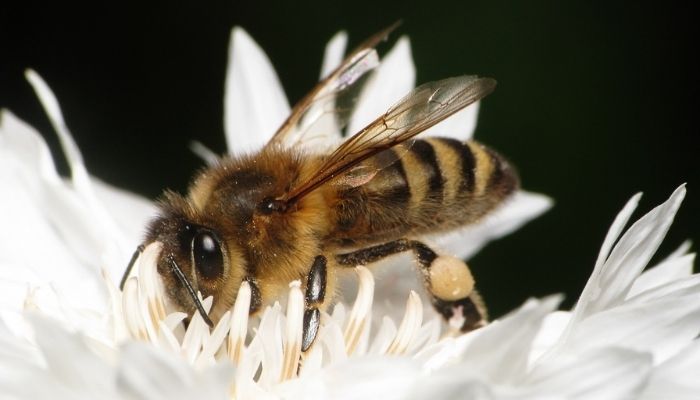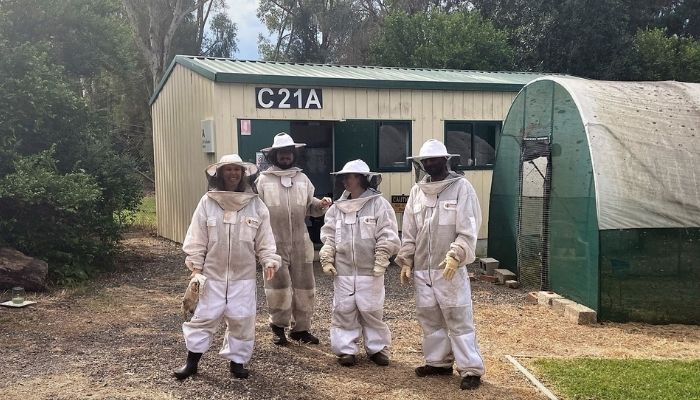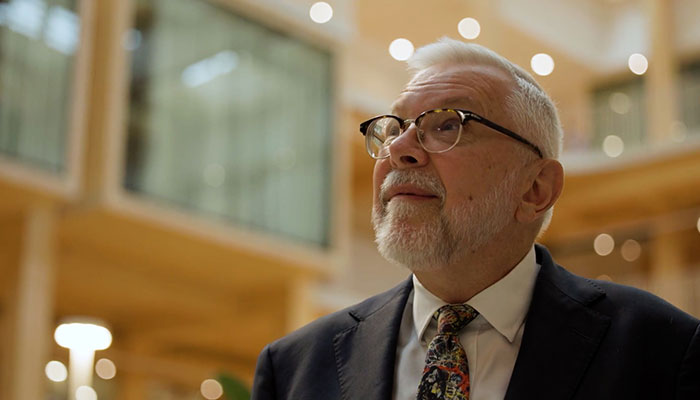Researchers at Macquarie University hope a new chemical-free, probiotic treatment will help boost the resistance of honeybees to viral and bacterial diseases, strengthening their gut health and supporting them to thrive and survive.

Bee colonies have been declining around the world affecting global food supply with devastating impacts on pollinating crops and honey production, says project lead Dr Fleur Ponton from the School of Natural Sciences. The rise of infectious diseases infiltrating hives around the world harms honeybees’ ability to pollinate.
“Probiotic treatments have recently been shown to increase the resistance of the European honeybee, which is the domestic bee found in Australia, to specific viral and bacterial diseases," says Dr Ponton.
"Yet, several different diseases infect hives and it is challenging to anticipate which disease is responsible for poor hive performance. With this in mind, our team is working towards a more broad-spectrum approach to disease resistance instead of looking at just one singular infection."
How bees feed the world
The humble honeybee plays a major role in balancing our ecosystem through the process of pollination, which is vital to ensuring the healthy growth of our plants including food crops, says Dr Ponton.
"Supporting their health is therefore key to maintaining ours as humans and the functioning of ecosystems.”
Funded by Hort Innovation and Macquarie University, the research advancement will ultimately support the Hort Frontiers Pollination Fund which aims to stop declining bee numbers around the world.
There is plenty of evidence in other animals and even humans that highlights how overall gut health can affect memory and learning abilities.
According to Hort Innovation, pollination-dependent crops in Australia are worth an estimated $4.3 billion per year. The direct contribution by honeybees is thought to be more than $1.6 billion. Australia has an estimated 600,000 hives, and a honey production of around 30,000 tonnes each year.
As part of their research, Dr Ponton and fellow insect scientist Dr Ajay Narendra, hope to create early warning tools that can detect diseases in hives quickly and efficiently.
“An early warning system for disease detection could be very useful from a biosecurity perspective, helping scientists monitor for new diseases entering hives and infecting bees,’ Dr Narendra says.
“This will ultimately make hives more resilient.”
More than a gut feeling
The project will also investigate the honeybee’s brains and how illnesses impact their ability to learn and memorise, which scientists say is a contributing factor to poor hive performance and reduced pollination.

Bee team: Dr Fleur Ponton (left) and the Macquarie University's probiotic research team in the field.
“There is plenty of evidence in other animals and even humans that highlights how gut microbiota and overall gut health can affect memory and learning abilities,” says insect neurobiologist Dr Ajay Narendra.
“When thinking about the day-to-day activities of a bee, they come out of the hive and try to find food,” he says. “At the end of the day, they must identify where exactly their home hive is, otherwise they could die.”
“The pressure of knowing where they must come back to and tapping into their learnt memory is immensely important for their survival.”
- Single sex vs co-ed: which is better for kids' education?
- Clinical trial to test psychadelics in treating depression
The research team, including insect experts Professor Andrew Barron and Dr Theotime Colin, and microbe expert Dr Sasha Tetu, will look at a variety of ways to deliver the right probiotic mix to hives.
“The possibilities for delivery are endless. One potential idea could include supplemental feeding to honeybee hives, a common practice already in many countries but less developed in Australia,” Dr Ponton says.
“Beekeepers in Europe and North America often feed supplemental food patties containing pollen, soy proteins and sugar mixtures to hives. These mixtures do not however contain probiotics just yet.”
Dr Fleur Ponton is a Senior Lecturer in Insect Biology from the School of Natural Sciences at Macquarie University.
Dr Ajay Narendra is a Senior Lecturer in Insect Neurobiology from the School of Natural Sciences at Macquarie University.



